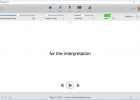Cargando...
Recursos educativos
-
Nivel educativo
-
Competencias
-
Tipología
-
Idioma
-
Tipo de medio
-
Tipo de actividad
-
Destinatarios
-
Tipo de audiencia
-
Creador
Lo más buscado
- Teoría del arte
- Recursos 2.0
- Imprimir números romanos
- Instrumentos de madera
- Repaso de fracciones
- Repaso acentuación
- La República romana
- Comunicación animal
- Actividades educativas para niños
- Rios de América
- Múltiplos de 7
- Arte mozárabe
- Juegos de dictado de palabras
- Centenas, decenas y unidades
- Repaso de economía
-

Analyse. Water recycling
EduBook Organización
- 1989 visitas
Using the diagram, explain how recycling works. Do you recycle your domestic waste? Explain how.
-

Final evaluation 8 - The Greek world
EduBook Organización
- 1751 visitas
How did Athens become dominant in Greece? How did its dominance end?
-

Answer. Environmental problems in cities (1)
EduBook Organización
- 1472 visitas
How do cities affect the natural landscape? How can these changes affect the climate?
-

Final evaluation 10 - The economic organisation of society
EduBook Organización
- 1276 visitas
How has the widespread use of IT changed how people work?
-

Final evaluation 1 - The Animal Kingdom (I). Invertebrates
EduBook Organización
- 1087 visitas
Compare a sponge to a polyp? How are they similar? How are they different?
-

Answer. Plants (1)
EduBook Organización
- 794 visitas
What is the difference between how animals feed and how plants feed?
-

Earthquakes
Cristina Seco Organización
- 928 visitas
Information about the earthquakes, how they are produced and how to measure them.
-

Earthquakes
V&V Books Vicens Vives Organización
- 1369 visitas
Discover how earthquakes are caused and how we measure their magnitude.
-

Interpret. Equatorial climate
EduBook Organización
- 5353 visitas
Look at this climograph and answer the questions: What are temperatures in equatorial climates like? What is the average annual temperature? Do temperatures vary much during the year? What about annual…
-

Spreeder CX Tool SM
Francisco Cerrillo Docente
- 1 lo usan
- 1485 visitas
Most readers have an average reading speed of 200 wpm, which is about as fast as they can read a passage out loud. However, it is entirely possible to read at a much greater speed, with much better…
Te estamos redirigiendo a la ficha del libro...











